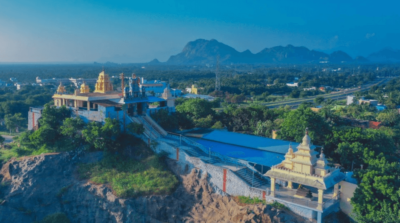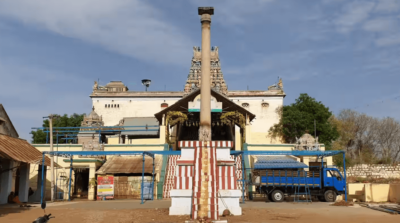Kollimalai Murugan Temple
Kollimalai, also known as Kolli Hills, is a mountain range located in the Namakkal district of Tamil Nadu, India, known for its rich history, spiritual significance, and lush scenic beauty. It is a prominent pilgrimage site for devotees of Lord Murugan, with several temples dedicated to the Tamil god of war, wisdom, and youth. Kollimalai Murugan temples are integral to Tamil religious culture, and they attract many devotees and tourists alike.
Kollimalai Hills and Their Significance
- Sacred Mountains: Kollimalai Hills, part of the Eastern Ghats, have long been revered in Tamil folklore and Sangam literature. Known for their mysterious beauty, these hills are associated with legends, ancient Tamil tribes, and the rich heritage of Murugan worship.
- The Name “Kolli”: The hills are said to be named after the deity Kollipavai, a protective goddess worshipped by the people of the region. The hills are also closely associated with Siddha tradition, believed to be home to sages and mystics.
Major Temples and Shrines
1. Arappaleeswarar Temple
- Location: Located on Kollimalai, this temple is dedicated to Lord Shiva and is believed to be over 1,200 years old.
- Connection to Murugan: Although the temple is primarily dedicated to Lord Shiva, Lord Murugan is also worshipped here, as Murugan worship is closely linked to Shaiva tradition in Tamil Nadu.
- Architectural Beauty: The temple exhibits traditional Dravidian architecture with beautiful stone carvings and inscriptions that detail the history of the region.
2. Ettukai Amman Temple
- Location: Situated in Kollimalai, this temple is dedicated to Goddess Ettukai Amman, a guardian deity believed to protect the hills.
- Murugan Worship: Devotees visit this temple alongside their pilgrimage to the Murugan temples, as the local tradition considers Murugan the protector of hills and people.
3. Kavadi Kundru Temple
- Connection to Murugan: This temple is dedicated solely to Lord Murugan. It is said that Murugan rested on this hill while on his way to fight the demon Surapadman.
- Significance of “Kavadi”: The word “Kavadi” refers to the practice of carrying offerings for Murugan. This temple is especially visited during Thaipusam when devotees carry Kavadi and walk barefoot as an offering to Lord Murugan.
4. Vetri Vel Murugan Temple
- Location: Located in the Kolli Hills, this temple celebrates Lord Murugan’s role as the “God of the Victorious Spear” or “Vetri Vel.”
- Victory Worship: Devotees pray here for victory over obstacles and success in life’s endeavors. The temple’s deity is adorned with a Vel, symbolizing power and wisdom.
- Festivals: Skanda Sashti, Thaipusam, and Panguni Uthiram are major festivals celebrated with grand processions, rituals, and devotional music, attracting devotees from all over Tamil Nadu.
History and Cultural Importance
- Ancient Origins: The Kolli Hills and its Murugan temples are believed to be thousands of years old, with mentions in Tamil Sangam literature. These hills have been described as the dwelling place of sages, warriors, and worshippers of Murugan, who is considered the god of mountainous regions.
- Sangam Literature and Folklore: Kollimalai is mentioned in Sangam literature as one of the regions blessed by Murugan. The area was known to be sacred for ancient Tamil tribes, who believed Murugan protected their land and people.
- Association with Siddhars: Kollimalai Hills are closely linked to the Siddha tradition, with many Siddhars (ancient Tamil mystics and healers) believed to have meditated here. Devotees come seeking blessings and cures through the Siddha practices that have been part of the Kollimalai region for centuries.
Festivals and Celebrations
- Skanda Sashti: This festival, celebrated in October or November, commemorates Lord Murugan’s victory over the demon Surapadman. Devotees participate in a six-day fast, and the festival culminates in dramatic reenactments of the battle and Murugan’s victory.
- Thaipusam: Observed in January or February, Thaipusam marks the day when Parvati gave Murugan the Vel to vanquish evil forces. Devotees undertake penance, carry Kavadi, and perform rituals in the temples.
- Panguni Uthiram: Celebrated in March or April, this festival signifies the celestial marriage of Murugan and Deivanai, and is marked by elaborate rituals, poojas, and processions.
The Sacred Journey and Spiritual Practices
- Trekking to Temples: Reaching the Kollimalai Murugan temples often involves trekking, symbolizing a pilgrim’s dedication and perseverance. The journey itself is considered a form of devotion, as devotees brave the hills to reach the temples.
- Offerings and Prayers: Devotees offer fruits, flowers, milk, and other offerings to Lord Murugan. Kavadi offerings are a special feature of Murugan worship here, symbolizing surrender and devotion.
Kollimalai’s Murugan temples hold deep cultural and spiritual importance, representing the ancient Tamil reverence for Murugan as a god of the hills, protector, and divine warrior. The temples remain a focal point for Tamil culture and spirituality, providing a link to the region’s rich heritage and natural beauty.




